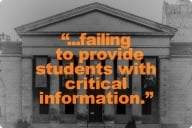You have /5 articles left.
Sign up for a free account or log in.
The U.S. Education Department will now recognize the marriages of same-sex couples for the purposes of distributing federal financial aid, officials announced Friday.
The policy change is the result of the Supreme Court’s decision in June that invalidated part of a federal law, the Defense of Marriage Act, which prohibited agencies from recognizing same-sex marriages.
Under the new rules, the federal government will treat gay couples who are married in a state or country recognizing same-sex marriage the same as their heterosexual counterparts regardless of where the couple resides or where the aid will be used. The standards apply both to independent students seeking aid as well as the parents of dependent students.
The new policy takes effect immediately although the actual financial aid forms that reflect the changes will not be officially released until January 1.
Students who are affected by the changes and have already filled out the Free Application for Federal Student Aid, known as FAFSA, for the current academic year have the option of filing a correction and having their aid adjusted accordingly. Starting in the 2014-2015 academic year, the changes will be required.
Even before the Supreme Court’s decision in June to strike down the Defense of Marriage Act, the Education Department said it would adopt gender-neutral descriptions of parents on the FAFSA starting in the 2014-2015 academic year. The department said at the time it was changing its interpretation of the Higher Education Act to allow the FAFSA to collect information from a dependent student’s legal parents who live together, regardless of whether they are a same-sex or opposite-sex couple. This change will decrease the federal aid awarded to some students, because the government will be counting two parents' incomes as opposed to one. However, in some circumstances, the recognition of two gay parents would increase a dependent student's aid eligibility. (A dependent student's need may marginally increase with the addition of a second parent because it increases the size of the household. If that increased need exceeds the amount by which the second parent's income reduces the student's need, he or she could be eligible for more aid.)
Friday’s guidance most significantly impact independent students by providing parity between legally married same-sex and opposite-sex couples when one or both apply for aid for themselves. Until Friday, a student who had legally married someone of the same gender in one of the 15 states and Washington, D.C. where such unions are currently permitted, would have had to select “single” when applying for federal student aid.
The guidance will also require the government to treat students under 24 who are married as independent of their parents, regardless of whether they are in a same-sex or opposite-sex marriage.
These changes, too, can either increase or decrease a student's eligibility for aid based on the circumstances. The marital status and dependency status of an applicant for federal student aid can significantly alter -- in both directions -- the amount of aid to which he or she is entitled.
"We must continue to ensure that every single American is treated equally in the eyes of the law, and this important guidance for students is another step forward in that effort,” Education Secretary Arne Duncan said in a statement. “As students fill out their FAFSA this coming year, I'm thrilled they'll be able to do so in a way that is more fair and just.”
Shane Windmeyer, executive director of Campus Pride, said that while he supports the new policy, it represented only an incremental boost for gay rights, noting that the majority of states prohibit same-sex marriage.
He also said that the federal government, including the Education Department, should do much more to make sure gay students were treated equally and fairly on college campuses. For instance, he said, the federal government should require colleges receiving federal student aid money to have policies protecting gay students from discrimination. He also would like to see the Education Department track completion and retention rates for students who identify as lesbian, gay, bisexual and transgender.








